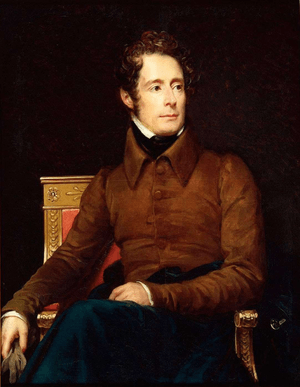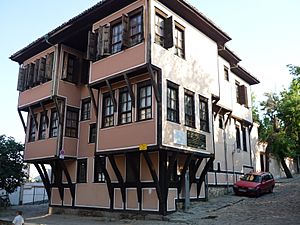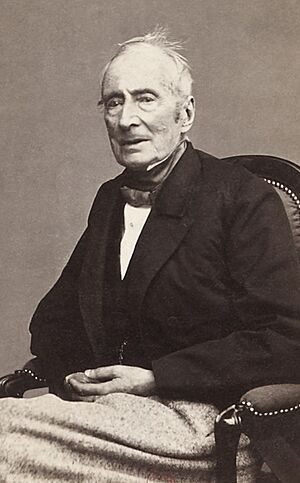Alphonse de Lamartine facts for kids
Quick facts for kids
Alphonse de Lamartine
|
|
|---|---|

Alphonse de Lamartine by François Gérard (1831)
|
|
| Member of the National Assembly for Saône-et-Loire |
|
| In office 8 July 1849 – 2 December 1851 |
|
| Preceded by | Charles Rolland |
| Succeeded by | End of the Second Republic |
| Constituency | Mâcon |
| Minister of Foreign Affairs | |
| In office 24 February 1848 – 11 May 1848 |
|
| Prime Minister | Jacques-Charles Dupont |
| Preceded by | François Guizot (also Prime Minister) |
| Succeeded by | Jules Bastide |
| Member of the National Assembly for Bouches-du-Rhône |
|
| In office 4 May 1848 – 26 May 1849 |
|
| Preceded by | New constituency |
| Succeeded by | Joseph Marcellin Rulhières |
| Constituency | Marseille |
| Member of the Chamber of Deputies for Saône-et-Loire |
|
| In office 4 November 1837 – 24 February 1848 |
|
| Preceded by | Claude-Louis Mathieu |
| Succeeded by | Charles Rolland |
| Constituency | Mâcon |
| Member of the Chamber of Deputies for Nord |
|
| In office 7 January 1833 – 3 October 1837 |
|
| Preceded by | Paul Lemaire |
| Succeeded by | Louis de Hau de Staplande |
| Constituency | Bergues |
| Personal details | |
| Born |
Alphonse Marie Louis de Prat de Lamartine
21 October 1790 Mâcon, Burgundy, France |
| Died | 28 February 1869 (aged 78) Paris, French Empire |
| Political party | Social Party (1833–1837) Third Party (1837–1848) Moderate Republican (1848–1851) |
| Education | Belley College |
| Profession | Writer, poet |
| Writing career | |
| Period | 19th century |
| Genre | Novel, poetry, history, theatre, biography |
| Subject | Nature, love, spiritualism |
| Literary movement | Romanticism |
| Years active | 1811–1869 |
| Notable works | Graziella (1852) |
| Signature | |
 |
|
Alphonse de Lamartine (born October 21, 1790 – died February 28, 1869) was a famous French writer, poet, and politician. He played a key role in creating the Second Republic of France. He also helped keep the French flag, the Tricolore, as the national flag.
Contents
About Alphonse de Lamartine
Early Life and Poetry
Lamartine was born in Mâcon, Burgundy, France, on October 21, 1790. His family was part of the French nobility. He spent his childhood at their family estate.
He became famous for his poetry, especially a poem called "Le lac" ("The Lake"). This poem is about a deep love between two people, told from the point of view of the person who is left behind. Lamartine was very skilled at using French poetic forms.
In 1820, Lamartine published his first major poetry collection, Les Méditations Poétiques. It made him famous almost overnight. One of the well-known poems in this collection was Le Lac, which he wrote for Julie Charles.
He worked for the French embassy in Italy from 1825 to 1828. In 1829, he became a member of the Académie française, a very important French institution for language and literature.
Entering Politics
Lamartine was first elected as a deputy (a type of representative) in 1833. He published a book called "Voyage en Orient" in 1835. It was an exciting story about his journey to countries in the Middle East.
He started as a supporter of the monarchy (a system with a king or queen). However, around 1830, his ideas changed. He began to believe in democratic ideals, which means he supported government by the people.
He also spoke out against militarism, which is the belief that a country should have a strong military and be ready to use it.
A Leader in the Second Republic
When he was elected to the French National Assembly in 1833, Lamartine created his own "Social Party." He became a strong critic of the July Monarchy, which was the government at the time. He became more and more of a republican, believing in a republic without a king.
In 1848, France experienced a revolution. Lamartine played a very important role during this time. He was briefly in charge of the government during the uprising of 1848.
He served as the Minister of Foreign Affairs from February 24 to May 11, 1848. He helped lead the Provisional Government, which was a temporary government set up after the revolution.
Lamartine was key in creating the Second Republic of France. He met with other republican leaders to form the new government. He famously declared the Republic from the balcony of the Hôtel de Ville in Paris.
He also made sure that the Tricolore (the blue, white, and red flag) remained the national flag. Some people wanted to change it to a red flag, but Lamartine argued passionately for the Tricolore.
He said that the Tricolore had traveled the world with France's victories and freedoms. He believed it was the flag of the whole nation, not just one political group.
Lamartine tried to become president in the 1848 election. However, he lost to Louis Napoléon Bonaparte. After this, he left politics and focused on his writing.
Important Changes He Supported
During his time as a politician, Lamartine led efforts to make big changes. These included:
- The abolition of slavery in French territories.
- Ending the death penalty.
- Supporting the right to work for all citizens.
He was an idealist who believed in democracy and peace. His moderate views sometimes caused his supporters to leave him.
Later Life and Influence
In his final years, Lamartine faced financial difficulties. He published many books on different topics, like history and literary discussions. He called this "literary hard-labor" because he had to write constantly to earn money and pay his debts.
He died in Paris in 1869.
Lamartine is seen as the first French romantic poet. Romanticism was a movement that focused on emotion, nature, and individualism. Other famous writers, like Paul Verlaine and Leo Tolstoy, admired his work.
Frédéric Mistral, a Nobel Prize winner and important writer in Occitan literature, also received praise from Lamartine.
Other Interests

Alphonse de Lamartine was also interested in the Orient (the Middle East and Asia). He used themes from the Levant and the Bible in his stories and poems.
He had a special interest in Lebanon and the Middle East. He traveled to Lebanon, Syria, and the Holy Land in 1832–33. Sadly, during this trip, his only remaining child, Julia, died in Beirut at the age of ten.
Despite this tragedy, he saw the journey as a way to find new spiritual meaning. He believed the region could inspire a new kind of Christianity that might help Europe.
During his trip to Lebanon, he met local princes who loved poetry. A valley in Lebanon is still called the Valley of Lamartine to remember his visit. There is also a Lebanon cedar tree known as the "Lamartine Cedar," where he is said to have rested.
His trip to Lebanon influenced his 1838 epic poem, La Chute d'un ange (The Fall of an Angel). The story of this poem takes place in Lebanon.
Lamartine was raised by his mother to respect animals. He did not like eating meat, saying, "One does not have one heart for Man and one for animals. One has a heart or one does not." His writings later inspired people who supported vegetarianism.
Thoughts on Beliefs
On Society and People
Lamartine wrote about how society was changing. He believed that thanks to new ideas and Christianity, old barriers between different groups of people were breaking down.
He saw society as made up of different jobs and ways of life. There were landowners, workers, merchants, and those with different amounts of wealth. He noted that some people had inherited wealth, while others worked hard to earn it.
He described those who had no possessions except their hands and worked for their living. He said these people were sometimes wrongly called "the People." He believed everyone, no matter their job or wealth, was part of the nation.
On Catholic Priests
Lamartine also wrote about the role of Catholic priests. He described them as people who belong to a worldwide family, not just one local family.
He said that priests are involved in all important parts of life, from birth to death. They bless new babies, marriages, and comfort people who are dying.
He saw them as figures whom children respect and older people seek for wisdom. He believed priests were there to comfort those who were sad and to help both the rich and the poor. He felt they belonged to all social classes equally.
On Muhammad
In his book Histoire de la Turquie (1854), Lamartine wrote about Muhammad, the founder of Islam. He admired Muhammad greatly.
He said that if greatness is measured by a big goal, few resources, and amazing results, then no one in modern history could compare to Muhammad. He believed Muhammad moved not just armies and empires, but also millions of people, their religions, ideas, and souls.
Lamartine noted Muhammad's patience in victory and his focus on his beliefs rather than just gaining power. He saw Muhammad's constant prayers and conversations with God as signs of a strong belief, not a trick.
He described Muhammad as a philosopher, speaker, leader, lawmaker, warrior, and conqueror of ideas. He called him the founder of many earthly empires and one spiritual empire. Lamartine concluded by asking if there was any man greater than Muhammad, based on all measures of human greatness.
Images for kids
-
Portrait of Madame de Lamartine by Jean-Léon Gérôme (1849)
See also
 In Spanish: Alphonse de Lamartine para niños
In Spanish: Alphonse de Lamartine para niños
 | Leon Lynch |
 | Milton P. Webster |
 | Ferdinand Smith |



